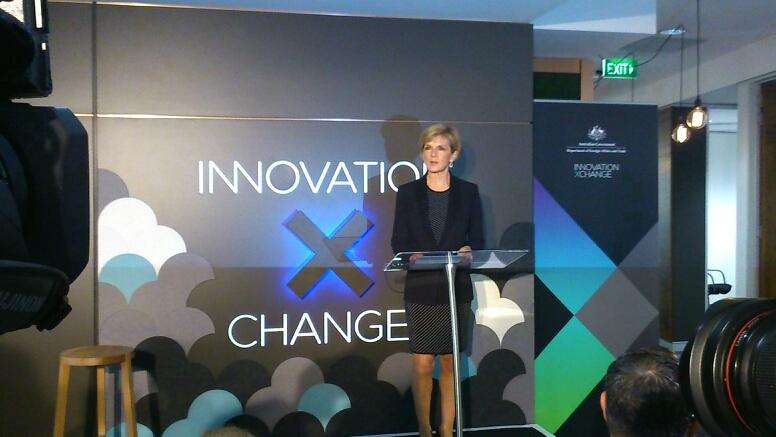Foreign Minister Julie Bishop knows government departments aren't renowned as sources of innovation - but that 'world view' is about to be disrupted in her portfolio department in a big way.
The Department of Foreign Affairs and Trade (DFAT) has set up innovationXchange – a $140 million hub that is expected to "mainstream" innovation in the department and "revolutionise" how Australian aid programs are delivered.
Physically, the hub sits outside the four walls of DFAT, and that is very much intentional.
"The fact that we are over the road from [DFAT] and not within the halls of the Department is meant to give you a bit of a flavour of Steve Jobs 'Team Mac' and the fact that he put up his little pirate flag above the creative location that was to be the home of Apple Mac," Bishop said at a launch event.
Bishop said the space of the design takes its influence from the likes of Google, Twitter and Facebook.
"If you've ever visited their locations overseas or in Australia there is this very open, casual, informal atmosphere that inspires creativity," she said.
The idea for the hub came out of a briefing Bishop had with the Stanford Business School "a number of years ago".
Among the topics discussed at the briefing was the existence of an entrepreneurial course that targeted foreign aid programs. It resonated in part because "seemingly intractable development problems" were lingering despite the attention of and investment from aid programs.
"For far too long we have pursued the same path, yet with no better outcomes," Bishop said.
The innovationXchange is expected to disrupt Australia's aid models using technology, ideas and partnerships.
Ideas flow at the #innovationXchange http://t.co/TGEkgWZef7 pic.twitter.com/C2IcuW8ALO
— DFAT (@dfat) March 22, 2015
Anchor projects
Three core initiatives have been announced.
The first is a $130 million partnership with Bloomberg Philanthropies called 'Data for Health', which aims to "build the capacity of governments in developing countries to collect vital health information".
The Australian Government is putting $20 million into the partnership. Non-monetary contributors to the initiative include University of Melbourne, John Hopkins University, US Centres for Disease Control, The Union North America, and the World Health Organisation.
The initiative is ultimately aimed at creating a repository of big data that can provide an evidentiary basis for policy decision-making – for example, on strategies to fight poverty.
"This focus on using information to drive decision-making is a traditional blind spot in development [of aid policy]," Bishop said.
"It seems basic, but it can change everything if we have both the right data and the knowledge to use it properly."
The second anchor initiative at innovationXchange is a $20 million tie-up between government and business to broker solutions to development challenges in the Pacific.
The third initiative is in the hub's governance – the establishment of an International Reference Group, a board of sorts that "will guide the work of innovationXchange".
Getting government to innovate
While innovationXchange physically sits outside DFAT, Bishop made no secret of the fact that she wants its ethos to rub off on those that sit across the road, inside the department's four walls.
"DFAT is one of the oldest portfolios, governed by perhaps the most deeply traditional protocols, and hierarchies," Bishop said.
"I aim to put innovation at the heart of all we do – my challenge for the Department of Foreign Affairs and Trade is: come up with the biggest, best and brightest new ideas about how we do business across the board – how we operate in all our spheres of influence."
For her part, Bishop hopes to prompt this direct disruption of the departmental culture with the DFAT Ideas Challenge – which cuts across more areas than aid.
"Whilst the innovationXchange is focused on aid and development, these are just one element of the broader works of the Department of Foreign Affairs and Trade in foreign policy – our diplomacy, our economic diplomacy, trade and investment work, our cultural and education programs, our work on security and stability," Bishop said.
She saw no specific impediment to the innovation mindset taking hold at DFAT – or in any government department or agency for that matter.
"Innovation is the natural territory of entrepreneurs, businesses, private sector operators, NGOs, academic institutions – where necessity pushes, where risk is a given and encouraged, where creativity is embedded in the way people think, and the way work is conducted and projects are run," she said.
"I believe governments need to learn from the private sector to apply innovation as a principle to deliver efficiency, a better quality of life, productive growth, and positive change."










